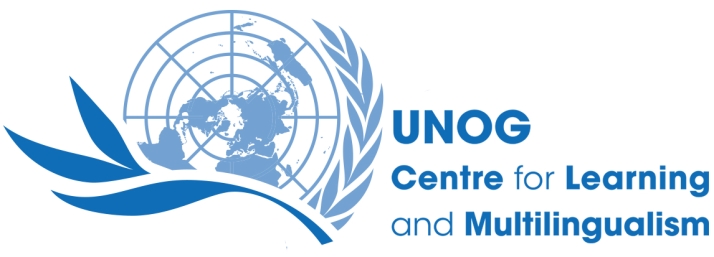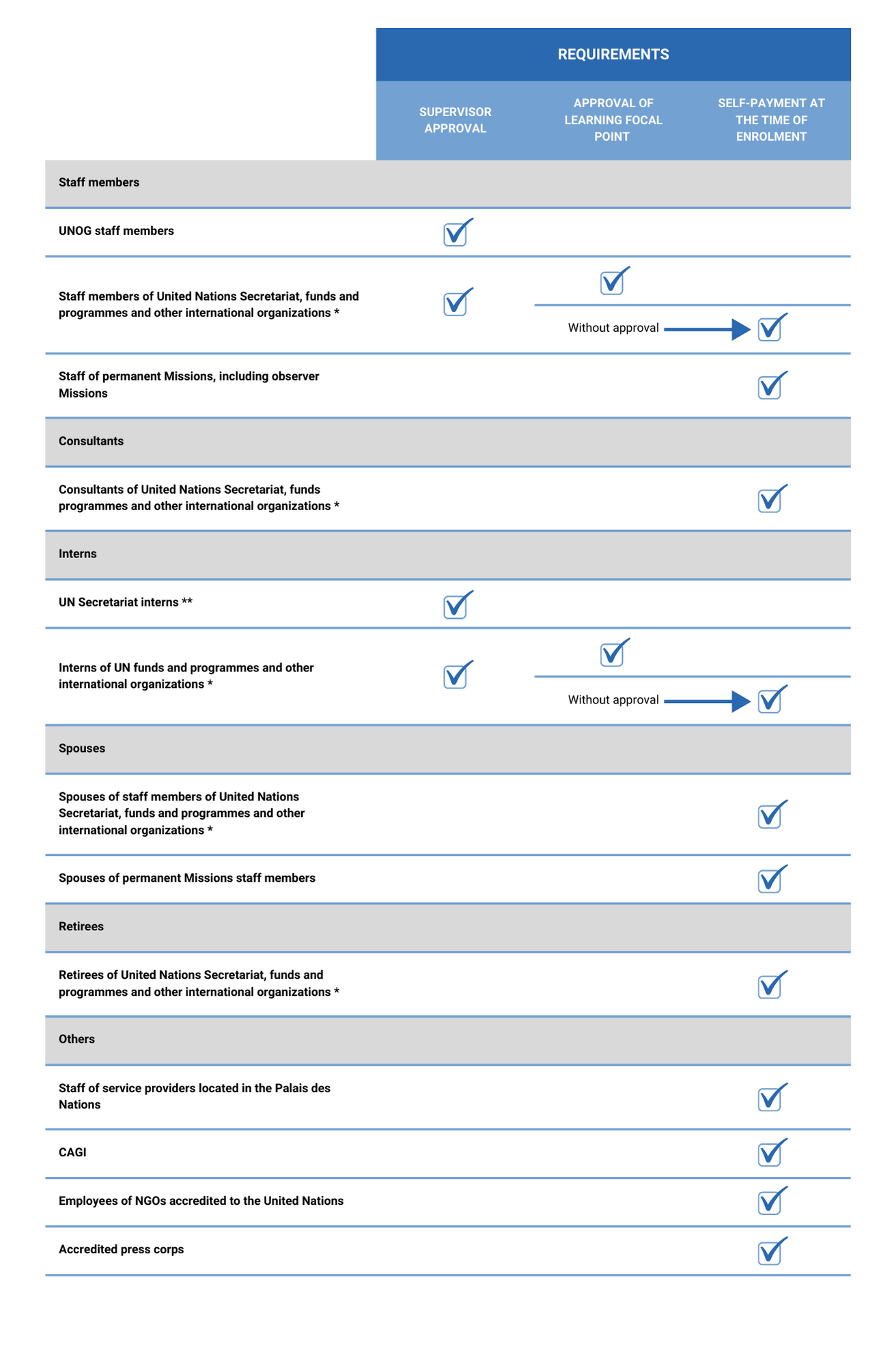1. ELIGIBILITY
1.1. Am I eligible to take a language course?
People in the following categories are eligible for UNOG language courses:
Employees, interns and consultant must be under contract for the entire duration of the term.

If you still have doubts, please consult our eligibility guide.
2. ENROLMENT
2.1 When is the registration period for the upcoming term?
The enrolment periods normally fall in February, May and October. For the winter, spring and autumn terms, the enrolment period lasts for three weeks and two days. For the summer courses, the period lasts 10 days.
A broadcast giving the exact dates is sent by e-mail to all UN staff members at the start of each enrolment period. An Information Circular with the full description of the Language Training Programme is also published once a year.
Please note that if you are currently enrolled in a course, re-enrolment is your responsibility and is not automatic.
To find out about the course calendar, the next enrolment period and other important dates, please consult the table below:
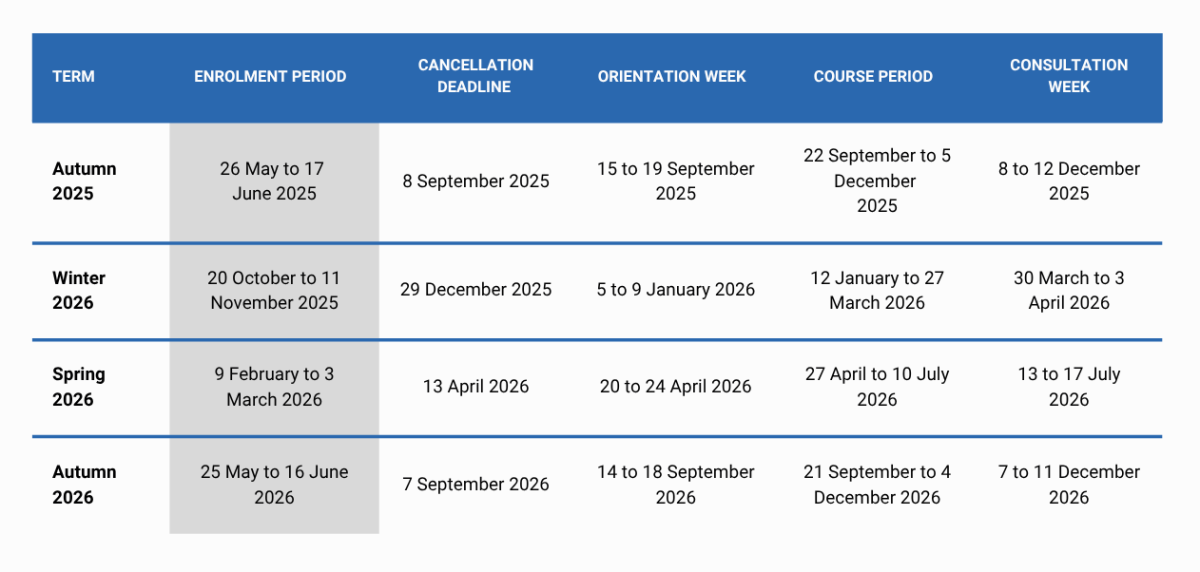
2.2. What should I know about the Language Training Programme enrolment procedures?
- There are four terms and four corresponding enrolment periods in the year.
- The enrolment periods normally fall in February, May and October and last for three weeks and two days. For the summer courses, the period lasts 10 days in May. A broadcast giving the exact dates is sent by e-mail to all UN staff members at the start of each enrolment period.
- You should submit your enrolment through online registration platform at https://clmlanguageregistration.unog.ch.
- Applications received outside the enrolment period, incomplete and/or without proof of payment of the applicable fees will not be considered.
- Enrolment is valid for one term only.
- You are responsible for re-enrolling and it is not automatic.
- You must obtain the authorization of your supervisor for all time choices you select in the enrolment form.
- Enrolments are considered on a first come, first served basis.
- Priority is given to students who are already in the Language Training Programme. Priority will be then given to the students who were on the waiting list from the previous term and to those who took a pause within two terms, followed by the applicants who took a placement test and finally the applicants who enrolled after the registration deadline. Applicants who wish to repeat a successfully completed course or did not complete the course for two consecutive terms do not receive priority.
- The Language Training Programme secretariat cannot guarantee the opening of all courses offered, nor a place in your preferred time schedule.
Enrolment procedure:
You need to enrol during the enrolment period by going to https://clmlanguageregistration.unog.ch and following the instructions below.
UNOG Staff
- You need your supervisor’s approval prior to enrolment.
- To enrol, go to the online registration platform at https://clmlanguageregistration.unog.ch.
- If you have attended CLM language courses after April 2016, select the option "log in" and follow the instructions.
If you have forgotten your password you can click the button “forgot your password” to reset it. - If you are a new applicant, you should select the option "Join" and follow the instructions.
ECE, OCHA, OHCHR, UNCC, UNCTAD, UNHCR, UNIDIR, UNEP, UNITAR and UNRISD staff and staff of other UN Organizations/Agencies
Go to the online registration platform at https://clmlanguageregistration.unog.ch.
- If you have attended CLM language courses after April 2016, select the option "log in" and follow the instructions.
If you have forgotten your password you can click the button “forgot your password” to reset it. - If you are a new applicant, you should select the option "Join" and follow the instructions.
Your enrolment request will be automatically sent to the learning focal point of your organization for approval. Please note that fees might be involved for your organization. Please contact your learning focal point prior to enrolment.
Other applicants:
Go to the online registration platform at https://clmlanguageregistration.unog.ch.
- If you have attended CLM language courses after April 2016, select the option "log in" and follow the instructions.
If you have forgotten your password you can click the button “forgot your password” to reset it. - If you are a new applicant, you should select the option "Join" and follow the instructions.
Before registration please make sure that you have the following documents in electronic version as you will need to update them in the system:
1) copy of the "Carte de legitimation" or official authorization from the employer, and
2) copy of proof of payment of the tuition fee (bulletin de versement or debit notification of the bank account if paid via e-banking).
Watch this step-by-step video on how to submit your registration.
2.4 What happens after I have applied for a language course?
- If places are available before the start of term, you will receive an official e-mail with information regarding class schedule and a link to where you can find the materials needed for your course.
- If there are no places available, you will receive an e-mail informing you that you are on a waiting list. If a place has not become available during the first week of courses, you will receive an e-mail informing you that unfortunately no spaces have become available. For self-paying students you will be reimbursed via an official procedure (please refer to point 5.3).
Priority is given to students who are already in the Language Training Programme. Priority will be then given to the students who were on the waiting list from previous term and the ones who took a pause within two terms, followed by applicants who took a placement test and finally applicants who enrolled after the registration deadline.
2.5 Where are the classrooms located?
Classrooms are temporarily located in the H Building: please see link to map of: the Palais des Nations
2.6 What shall I do if I forgot to enrol for the next term?
You cannot enrol in the Language Training Programme outside the official enrolment period. You should enrol during the next enrolment period.
2.7 What are my responsibilities as a student?
Students attending UN language classes must:
- Be on time, attend and actively participate in the classes.
- Participate in activities and continual assessment processes
Complete homework and autonomous activities outside class hours. - Inform their teacher of their absences via email.
- Purchase course materials before the end of the first week of term.
- Complete the online end-of-term evaluation.
2.8 What will happen if I miss the first week of class and if I have not notified my teacher or the Language Training Programme secretariat of my absence?
If you have not attended the first week of term or the first day of class for the summer courses and have not informed the secretariat or your teacher of your absence, you will be removed from the class list and your place will be given to a student on the waiting list. For fee paying students, course fees will not be reimbursed.
2.9 What should I do if I will be on mission for more than three weeks (more than 25% of the course) during the term?
If you know that you will be absent for more than three weeks during the term, we would advise you to consider postponing your registration until a time when you will be more available. If you still wish to enrol, you will work by yourself during the period when you are unable to come to class by consulting the online Moodle platform, where you can find your class programme and materials.
3. PLACEMENT TEST
3.1 Which course should I register for?
If you have previously studied the language in question outside the UN, you will need to take a placement test to be placed in the correct course. A test is mandatory for all new language applicants, unless they are complete beginners. After the enrolment period, you will receive an email with the instructions on how to take the placement test.
3.2 What should I do if I am returning to the Language Training Programme after an absence of two or more terms?
If you are returning to the Language Programme following an absence of two terms or more, you will be asked to take a placement test before resuming your studies. This is because during your absence, your level may have either improved or deteriorated.
3.3 What should I do if I think I have been placed in a course that is too easy/difficult?
Speak with your teacher as soon as possible. We can make adjustments during the first week of term. If your teacher agrees with you following a reassessment of your placement test or other considerations, you will be placed in the appropriate course (if space is available).
3.4 What happens after I have taken a placement test?
- If places are available in the course assigned to you, before the start of term you will receive an official email with information regarding the class schedule and a link to where you can find the materials needed for your course.
- If there are no places available, you will receive an email informing you that you are on a waiting list. If a place has not become available during the first week, you will receive an email informing you that unfortunately no places have become available.
IMPORTANT: Attending a placement test does not guarantee a place in our language courses. Priority is given to students who are already in the Language Training Programme. Priority will be then given to the students who were on the waiting list from the previous term and to those who took a pause within two terms, followed by applicants who took a placement test and finally applicants who enrolled after the registration deadline.
3.5 Why do I need to retake a placement test if I have failed or haven’t completed the same course twice?
If you have repeated the same course for two consecutive terms and either failed or not completed it, you will need to retake a placement test. This will ensure you are placed in the correct class to build the necessary foundations for progressing in your language studies.
4. CLASS SCHEDULE AND COURSES
4.1 Where can I find the Language Training Programme course offer?
You can find the courses on offer in our course list and a full description (content, objectives, format, etc.) at the links below:
4.2 What time do classes take place?
Classes normally run once or twice a week, either from 8 to 10 a.m., from 12.30 to 2.30 p.m., or from 6 to 8 p.m. Classes end 30 minutes earlier when an online autonomous learning component is offered.
During the summer term, classes normally run five days a week, either from 8:00 to 10:00 or during lunchtime from 12:30 to 14:30. The equivalent of four hours of autonomous learning activities are offered in addition to the summer courses.
For more details on the formats, delivery mode, and timetables for the next or current term please refer to the course list.
4.3 What kind of courses and how many hours are taught per term?
Language courses consist of either 24 or 48 learning hours in total over an eleven-week term. There is an orientation week before a course formally begins to introduce its objectives, content, evaluation system and resources, and for technical set-up. During this orientation week, the participants become familiar with the course learning tools, including the e-learning platform, and meet their teacher and their group. The term is followed by a consultation week to provide feedback and results, as well as discuss other course-related matters.
There are two types of courses: general and specialized.
- General courses – equivalent to 48 learning hours - develop spoken production and interaction, written production and interaction, listening and reading. These courses are designed to build on each other and are meant to be taken sequentially.
- Specialized courses develop specific language skills tailored to particular needs. For instance, they may concentrate on different aspects of the language, such as grammar, vocabulary, or written and oral proficiency. Some courses also target specific professional objectives, such as conducting meetings, preparing for interviews, or writing administrative correspondence. The specialized courses offered each term vary. They represent 48 or 24 learning hours per term or equivalent.
Courses may be delivered online or in person.
- “In-person” general courses: 3 hours a week of in-person courses + 1 hour and 15 minutes a week of autonomous online activities.
- “Online” general courses: 3 hours a week of tutor-led virtual courses + 1 hour and 15 minutes a week of autonomous online activities.
- The delivery mode of the specialized courses differs according to the content, the format and the language.
For more information, please refer to the course list.
4.4 Why have I not been allocated my requested time?
The reasons why you may not have been given your preferred schedule may depend on the following reasons:
- Teacher’s availability.
- Students preferred schedule and mode (in-person or online)
- The number of enrolments in your level decreasing, resulting in the merging of two different time schedules (e.g., the morning and the lunchtime classes merged into one)
4.5 Why can’t I keep the same teacher and the same schedule from term to term?
We understand the request of some students to continue studying with the same teacher from term to term. However, from a pedagogical point of view it is also important to change teachers. While scheduling the courses, criteria such as room availability, the teacher's availability, students’ preferred schedule, etc. need to be taken into consideration, which may affect your allocated schedule/teacher.
Please be reassured that all the teachers working for the Language Training Programme do their best to provide high standard conditions for language learning.
4.6 How are the class schedules determined?
The class schedule depends on different factors such as room availability, the teacher's availability*, and students’ preferred schedule and mode (in-person or online).
* Please note that in the Language Training Programme many teachers work on a part-time basis and they may have other commitments outside the Language Training Programme. They are therefore not always available outside of their teaching hours and the Language Training Programme cannot always offer morning and a lunchtime class for all courses.
4.7 What is there to know about the specialized language courses?
Specialized courses develop specific language skills tailored to particular needs. For instance, they may concentrate on different aspects of the language, such as grammar, vocabulary, or written and oral proficiency. Some courses also target specific professional objectives, such as conducting meetings, preparing for interviews, or writing administrative correspondence. They represent 48 or 24 learning hours per term or equivalent.
The delivery mode of the specialized courses differs according to the content, the format and the language.
The specialized courses offered each term vary. To know which ones are on offer, you need to refer to the course offer.
5. PAYMENT AND REIMBURSEMENT
5.1. Do I need to pay tuition fees?
Staff members of funds and programmes and other international organizations, non- UN Secretariat organizations, permanent missions and their spouses, spouses of United Nations staff members, employees of service providers located in the Palais des Nations, employees of non-governmental organizations (“NGOs”) accredited by the United Nations, accredited press corps, consultants, interns and retirees pay tuition fees as follows:
- 48-hour courses and equivalent specialized courses/term: CHF 650.-
- 24-hour courses and equivalent specialized courses/term: CHF 390.-
To know the price of the course you want to register for, check the course description or the course offer.
5.2. How do I pay?
Payment should only be made under the name of the applicant. In case of a refund, according to the UN financial rules and regulations, only the applicant/participant is eligible to receive the reimbursement.
Payment of the fees must be made before the application via e-banking:
PTT IBAN No. CH40 0900 0000 1200 5904 2 (the BIC/SWIFT code is POFICHBE)
United Nations Geneva, Special Accounts, Division des Finances, 1202 Genève
Box "motif de versement": “10RCR, applicant’s name, term and language" (ie: 10RCR, John Smith, Autumn 2020, Chinese)
The proof of payment should be then uploaded in the platform at the time of enrolment. Only a fully processed confirmation of the e-banking order is considered a proof of payment.
5.3. How do I get reimbursed?
Tuition fees are not refunded to participants who cancel their enrolment beyond the deadline.
Participants who cancel their enrolment before the deadline or are not given a place in a course may carry over their tuition fees to a future term instead of receiving a reimbursement. If you choose to carry over your fees, when reenrolling to a future term, please upload the proof of payment you are caring over.
If you choose to be reimbursed, please prepare the following documents:
1. the bank information document completed using word and sent back signed
2. a copy of an official bank information slip / bank statement with your IBAN and Bic information – see example
3. a copy of the bulletin de versement if paid through the post office or the bank account debit advice slip if paid through e-banking
4. a copy of the applicant/participant’s passport to create a profile in the UN administration system
5. include your postal address in the email
Finally submit your reimbursement request with the above documents attached to clm_language@un.org.
Reimbursements may take up to 8 weeks after the submission of the required documents.
6. WAITING LISTS
6.1 What happens if I have been placed on a waiting list?
When there are no places available in the course in which you have enrolled, you will be placed on a waiting list.
Students on a waiting list are informed by email a week before the start of term. If a place becomes available during the first week, you will receive an official email with information regarding your class schedule and a link to where you can find the books needed for your course.
If no place has become available during the first week, you will receive an email informing you that no places have become available and that your enrolment has been cancelled for that term.
Please note that the Language Training Programme secretariat tries to prioritize students who were on a waiting list the previous term over new enrolments. In order to increase your chances of enrolment, when enrolling in the following term, make sure you indicate in the "comments” box on the enrolment form that you were on a waiting list the previous term.
For self-paying students your fees may be kept for the next term or they can be reimbursed. Please refer to point 5.3 for the reimbursement procedure.
7. CANCELLATION
7.1 What should I do if I have to drop out of/cancel my language course?
You can cancel your enrolment any time four working days before the start of the term and two weeks before the start of the summer courses.
Students who wish to cancel their enrolment need to do it via the online registration platform (https://clmlanguageregistration.unog.ch). Go to the tab “current submitted forms”, select the cancellation form and click on the button: “Cancel Enrolment”. You will receive an email with the confirmation of the cancellation. When you cancel your course, your place is given to a student from the waiting list.
IMPORTANT: You can be reimbursed/your organization will not be billed only if you cancel your enrolment four working days before the start of the orientation week and two weeks before the start of the summer courses. If you cancel your enrolment at any time after the deadline, the fees of the course will not be reimbursed / your organization will be billed for the course.
7.2 What can I do if my class has been cancelled due to an insufficient number of students?
The Language Training Programme makes all possible efforts to offer a class at the next course for returning students. However, when the number of students is not sufficient, the secretariat is obliged to cancel classes.
- For Arabic, Chinese and Russian, classes are cancelled where there are less than seven students for winter, spring and autumn terms and eight for summer courses.
- For English, French and Spanish, classes are cancelled where there are less than eleven students for winter, spring and autumn terms and twelve for summer courses.
If your class has been cancelled due to an insufficient number of students, you will be informed by an official e-mail.
8. REQUESTS
8.1 What should I do if I have to change my class schedule?
You should contact the Language Training Programme secretariat requesting to change your schedule. If there is room in the class you would like to move to, you will be moved and if not, you will be put on a waiting list.
If you wish to change the schedule of your class, you should notify the Language Training Programme secretariat before the term starts or during the first two weeks of term. After the end of the second week of the term no more changes can be made.
8.2 What should I do if I need a certificate of completion?
If you need a certificate regarding attendance or completion of language courses, you can print it from the online registration platform (https://clmlanguageregistration.unog.ch). Go to the tab “History”, select the course you want a certificate for and click the button: “Print certificate”.
Please note that this certificate has no official value in the UN. Only the UN Language Proficiency Examination will provide you with official recognition of your efforts in learning a foreign language within the United Nations system.
8.3 What should I do if I cannot attend the end-of-term exam/final evaluation?
You need to notify your teacher as soon as possible. Please note that only work or medical related excuses are accepted: mission or certified sick leave.
If the reason is work or medical related, and if your absences do not exceed 25% of classes, you will be invited to attend a test during the 10th or 11th week of the term
If you fail to take the exam, your course will be considered incomplete.
IMPORTANT: Any reason that is not work or medical related (e.g. home leave, holidays, etc.) will not be considered as a valid reason for taking the test or exam outside the regular schedule.
8.4 What should I do if I cannot complete a task or a test in time in the continuous evaluation system?
You should mention this directly to your teacher, who will do their best to accommodate your request. Despite our efforts to accommodate these requests, please note that finding an alternate time or postponing a deadline is not always possible.
8.5 What should I do if I have questions regarding the course material or the content of my course?
If you have questions about course material or the content of the course you are invited to discuss it with your teacher. In this way, you can allow your teacher to be aware of your specific challenges and needs.
8.6 Do I qualify for the Language Proficiency Examination (LPE)?
For detailed eligibility criteria, enrolment information, practice exams, and more, please visit the Language Proficiency Examination webpage at https://hr.un.org/page/language-proficiency-examination-lpe.
9. United Nations Language Framework
9.1. What is the United Nations Language Framework ?

The United Nations Language Framework is a reference tool for learning and assessment in the six official languages within the United Nations.
It responds to the specific needs of our Organization by ensuring coherence in learning, teaching and evaluation in the six official languages and in the international context of the United Nations.
It establishes four levels of language proficiency, valid for all six official languages:
UN Level I or Basic Language Competence
UN Level II or Intermediate Language Competence
UN Level III or Advanced Language Competence, baseline for the Language Proficiency Examination
UN Level IV or Expert Language Competence
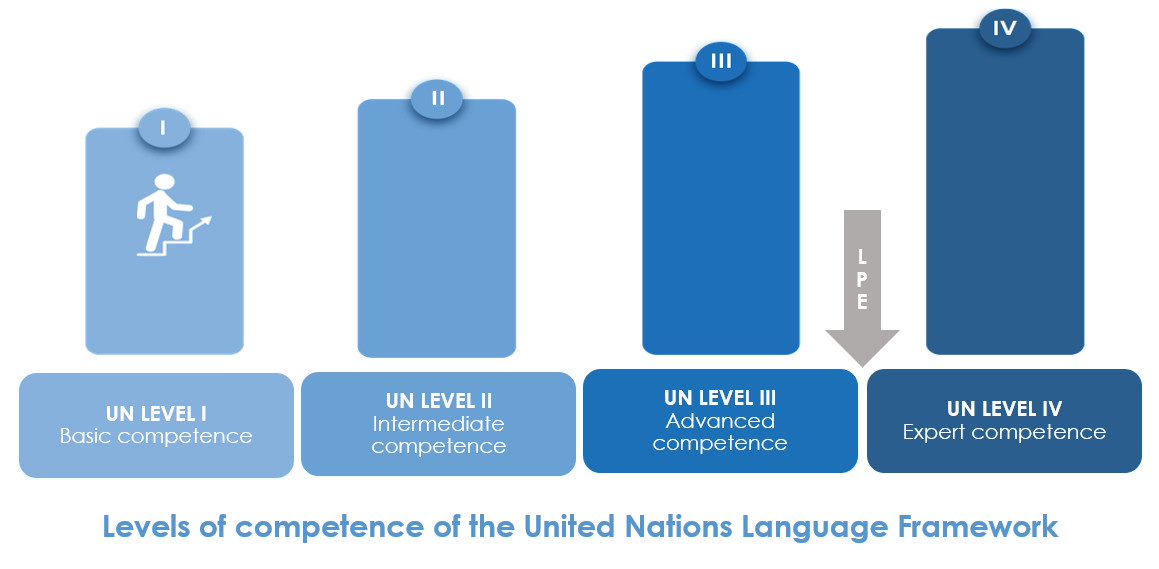
9.2. What is the United Nations Framework composed of?
The Framework consists of a common curriculum for the six official languages with global descriptors for UN Levels I to IV and descriptors specific to the language activities of reading, listening, spoken and written production and interaction.
A curriculum specific to each of the six official languages is also available. Discover the Framework via the links below.
UN Language Framework - UN Levels and Core Curriculum
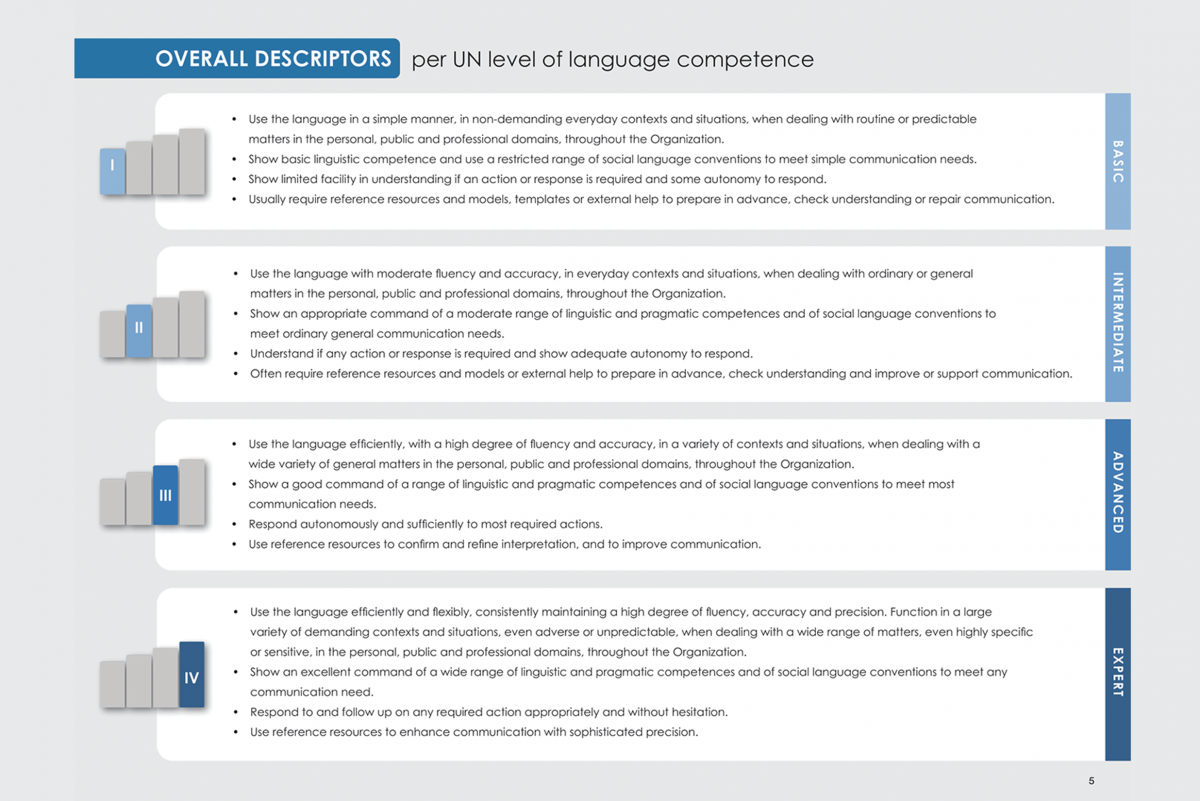
9.3. How does this Framework differ from other language reference frameworks?
This framework is an innovative tool because it takes full account of the specific international context in which United Nations staff operate. It promotes language skills in the professional, personal and public domains within the Organization.
9.4. Is there any equivalence with other existing frameworks?
The United Nations Framework builds on the work of various government institutions and other language reference frameworks, such as the Common European Framework of Reference and the ACTFL Competence Guidelines. It, therefore, makes it possible to find equivalence between the UN levels and those of other existing frameworks.
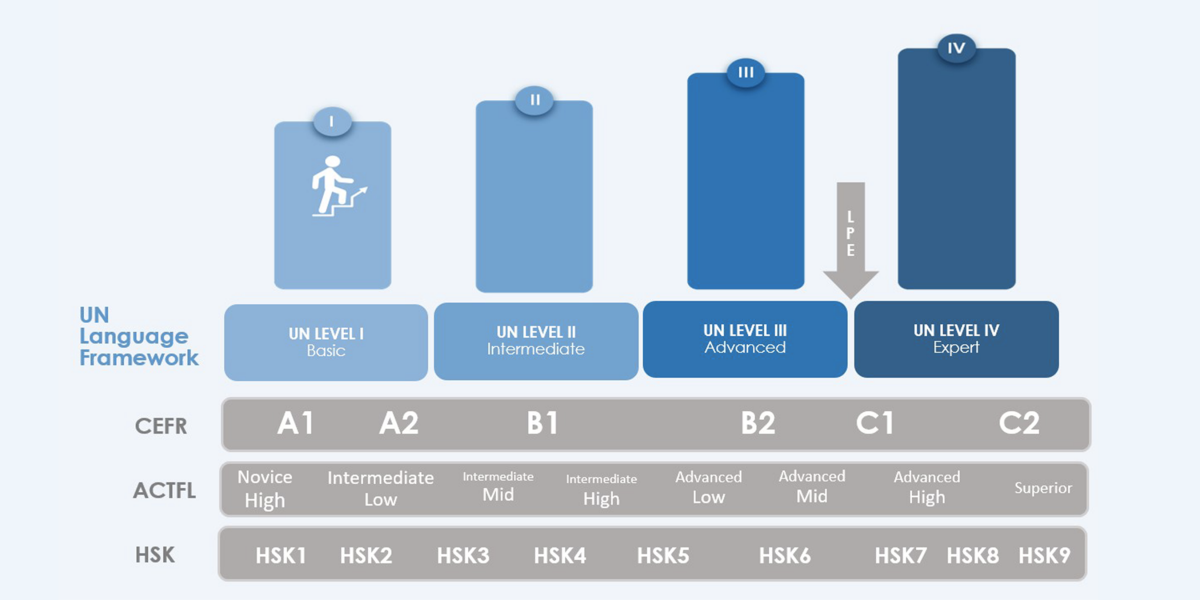
9.5. Do the language courses offered at UNOG refer to the UN Language Framework?
The United Nations Language Framework aims to harmonize teaching and learning in the six official languages within the Organization.
All courses in the Geneva Language Training Programme are now fully aligned with the UN levels of the Framework in each of the six official languages. This is reflected in the table below.
The number of general courses offered at each UN level varies by language, as the learning time required to acquire language skills differs from one language to another.
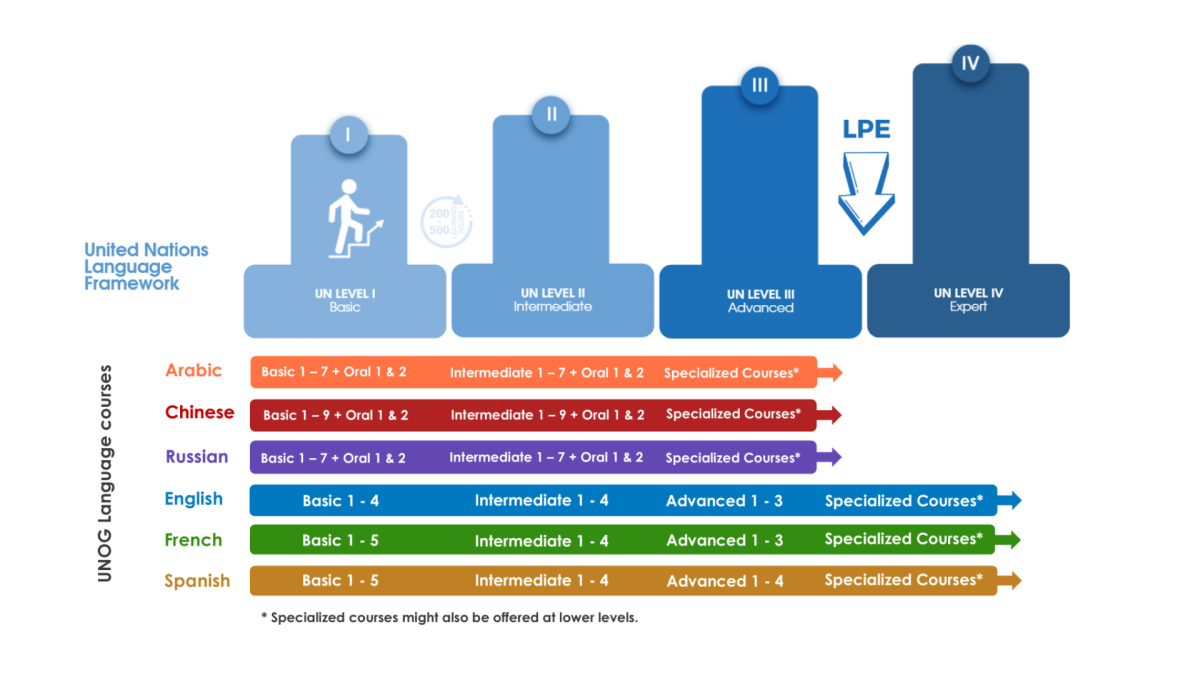
The names of the courses offered mention the UN reference level. Example: "Advanced Practical Life through French (UN III)".
For an overview of the programmes, please click on the language you are interested in:
9.6. How can I validate my language skills against the levels of the Framework?
One of the objectives of this Framework is to harmonize the assessment of language competence. It will, therefore, allow users to certify their language level with tests or examinations evaluating the language skills acquired at the end of the various UN levels:
-
UN Level I Test
-
UN Level II Test
-
Language Proficiency Examinations (LPE) - UN Level III acquired
We will gradually put these tests in place, soon to be offered.
9.7. Is this United Nations Framework only used at the United Nations Office at Geneva?
The United Nations Language Framework aims to harmonize language learning, teaching and assessment within the United Nations Secretariat and serves as a reference both at United Nations Headquarters, UNOG and other United Nations duty stations.
The Framework has been successful thanks to the work of the Language Training Programme (LTP) at UNOG, the Language and Communications Programme (LCP) at UNHQ, and other language programmes in the Secretariat. It has also benefited from contributions, support and feedback from many individuals in different departments, especially from the Focal Points of Multilingualism.
9.8. Can the levels of the Framework be used to describe my language level in my Candidate Profile (CP) on Inspira?
The United Nations Framework is also a tool to facilitate transitions related to mobility and career development and allows for greater recognition of the language skills of United Nations staff members. Thus, it could eventually be used as a reference in the self-assessment or certification of their language skills in the six official languages of the United Nations as well as in any other language, whether mother tongue or learned language.
Contact US
If you do not find the answer to your questions in the above information, please fill out a contact form. We will respond to you shortly.
